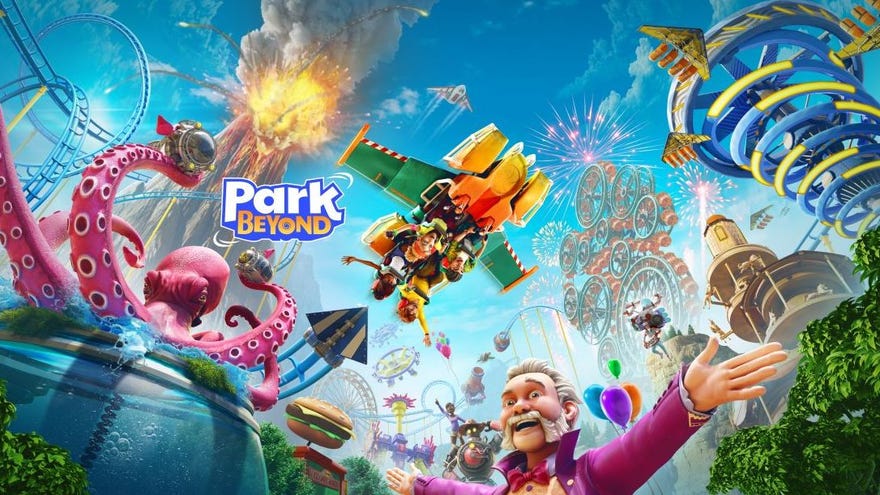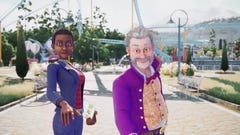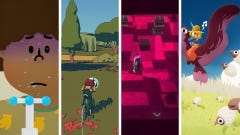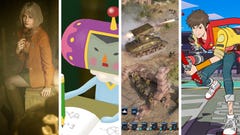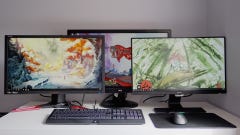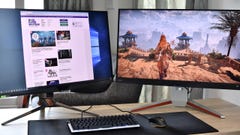Park Beyond is a new theme park game sim where management meets the impossible
To dream the impossified dream
For some people their acts of wanton cruelty as children were burning ants. Others built rollercoasters to nowhere in theme park management games, launching their visitors to violent and abrupt death. I already have your money, you tiny fool. Mwah-ha-ha-ha-ha-ha!.
So when I learned that the developers who did Tropico 6 are working on a theme park management game, I think I'd be forgiven for expecting a similar, tyrannical approach. But that's not the vibe for Park Beyond, announced yesterday at Gamescom's Opening Night Live and set for release next year. At least, it's mostly not that kind of vibe. Stephan Winter, CEO at Limbic Entertainment does say that you can charge people for using the toilets, and could set the price at a pretty despotic level if you wanted to. Johannes Reithmann, the creative director, is just very excited to talk about rollercoasters and Park Beyond's core theme: "impossification".
In fact, both Reithmann and Winter are so happy - almost giddy and giggling - to talk about Park Beyond that it's hard not to get swept up in their enthusiasm. And yes, research did involve going to a bunch of different theme parks, though Winter is, like me, the bag-holder who hates rides. Impossification, an entirely made up, almost Dahl-ian word, describes how the rides in Park Beyond can be made all, well, impossible.
After working on Tropico 6, the team wanted to do something different, and early in the pre-production phase the whole of Limbic went to a theme park. They started throwing ideas around. Like, how cool would it be to ride a ride that actually shoots you through the air?
"We got a lot of people really excited about it, a lot of ideas were flowing, and we said, 'Hey yeah, I think this would be cool,' to really give the players the possibility to build the park of their dreams," says Reithmann. "Not being bound too much about, like, is this completely safe in reality. We said let's do this, and really push the theme park genre beyond what is currently possible."
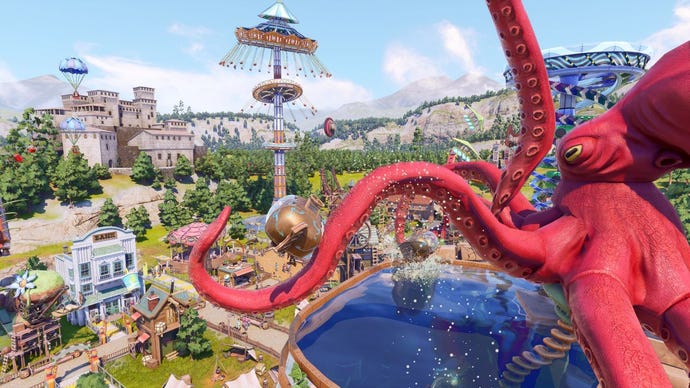
The goal is to make the rides actually be like how children imagine they are when they ride them. A rollercoaster that feels like you're flying? Welcome to a coaster with a cannon module. A ferris wheel feels really high, but it feels even higher if it's four ferris wheels stacked on top of each other like interlocking cogs.
Aside from the theme park games you'd expect - the team are fans of classic tycoon games - it was this sense of childish wonder that was a key source of inspiration. "If you take kids to a theme park or a fair, their excitment is through the roof. But actually the real stuff happens in their imagination," says Winter. "Can we exaggerate this excitement?"
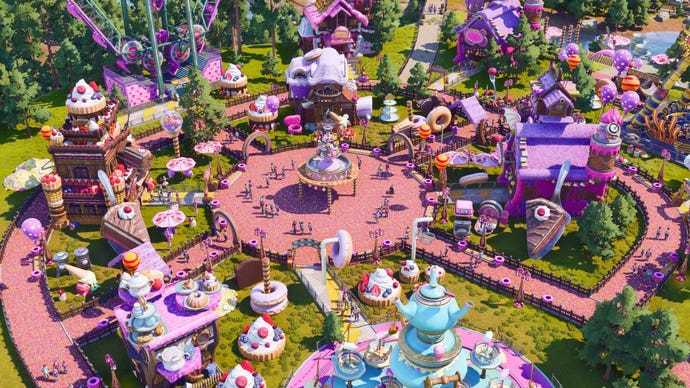
They've only revealed Candyland and Western themes right now, and won't even say how many themes might be in the final game, but I am assured it's a mix of what you'd expect and what you wouldn't. You can also mix themes up by building different stuff all together, and create, I dunno, a Western Candyland. I have to say, I do really love some of the details here, like all the giant delicious decorations in Candyland, and the pink hearts on the paths. Also a concession in the Western theme is called Colonel Burger.
In practise, impossifying a ride is governed by a new resource that, for now, is called Amazement, which is generated by your visitors in a similar way to how they generate money. "With this resource, it gives you inspiration opportunities in the research system," Winter explains, emphasising that while the system does have progression opportunities, it's not a linear progression or standard tech tree. "We have an inspiration system where the player decides, 'I'm inspired to unlock a thrill ride for adults,' and this might unlock new impossifications in this direction. Or you say, 'I wanna unlock new stuff within a theme,' and you get new content for a theme like Candyland or Western."
Park Beyond features a deliberate tension between creativity and cold hard capitalism. Two of your advisors (though there are others) represent that conflict. Phil is a creator who loves your weird new ideas; Izzy is aware those ideas also need to satisfy the board. "There's a conflict - even as developers, we know this conflict!" says Winter. "For 20 years we're running around with this conflict about how creativity meets money!"
As the new park architect, you have to have pitch meetings where you sell your next big idea. "Again, one of the things taken from real life development!" says Reithmann. "The pitch meeting! The idea was, we want the player to be the 'visioneer', and it didn't sit with us that the game is telling you exactly what to do to accomplish the mission." Instead, you're presented with a problem - a park already exists but isn't making money, for example. You pitch your solution: it should be for families; it should target teens; it should have thrill rides; it should be chilled out. Your goals for that level, and even your starting resources, will depend on what you pitch. As you progress and succeed, the board will trust you with weirder pitches.

That same tension exists in players of these games, though. Winter says he was surprised by this in play testing. One tester spent three hours just decorating the entrance to his park, and didn't do any management or even build any rides. Others wanted the ability to micromanage, like adjusting drinks prices differently at specific food concessions. "Realising what different player types meet in such a game? That's pretty cool," says Winter. "You get full creative, and you get full, hardcore management."
"I was just so excited about, like, shooting people through the air!"
Thus, Reithmann says, they made sure that players can customise their experience a lot, especially in the sandbox mode. You can even turn off some management features if you want to concentrate on building your dream park, and work with unlimited money or a fully unlocked research tree.
"But," he says, "if you're someone who really wants to be challenged from the economy and management side of things, and set goals for yourself and make it really hard, you can also do this." This is also where the team's experience on Tropico 6 helped. It might be a different tone, but Winter says that Tropico 6 being a deep simulation game was good experience for Park Beyond. Though impossification is a lot about creativity, Limbic want Park Beyond to be a good management game, too.
In general, theme park games tend to fall more on one side or the other - Parkitect is a good management game but pretty straight-faced, while I always found yer Theme Parks and Planet Coasters to be fun creative tools but less good at the management bit. Marrying both successfully would be quite something - not to mention difficult. Limbic are trying to make the game as accessible as possible for all players, with onboarding and tutorialising that introduces all the complex features gradually. The UX design means all features can be used with any control set up, there are pause and slow options to control the flow and game time however you want, and they're making sure to have things like good subtitling and colourblind options. "There's a list of things," says Winter. "It goes from onboarding everyone, to supporting everyone."
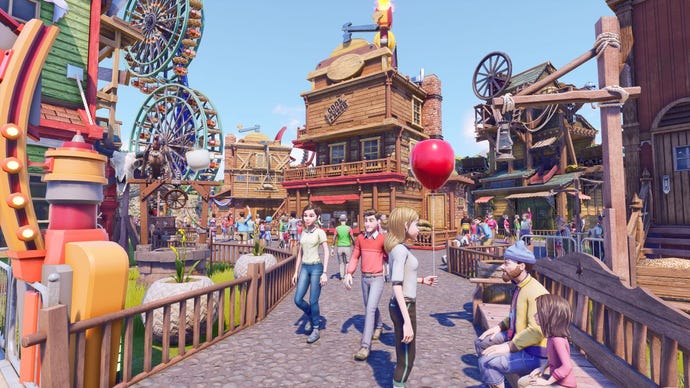
Certainly the assets we've seen so far look a lot of fun. Though they're not revealing everything right now, Winter and Reithmann are just so excited to talk about the different rides and features. Winter's favourite ride involves hurling vistors into the sky, collecting them in a funnel, and then sending them down slides to the exit. Reithmann loves building his own rides with the coaster editor, where carts are shot into each other's paths so they almost collide. "The cannon modules and ramp modules were some of the first things we implemented ever," he says, only just keeping a lid on his laughter, "Because I was just so excited about, like, shooting people through the air!"
So despite the bright pink of Candyland and the whimsy of stacking carousels, the tradition of putting your park visitors in mortal peril isn't entirely lost. Creativity involves a bit of risk, doesn't it? And while Limbic might be attempting the impossible in marrying creativity and capital, they seem to have a decent mindset going into the task.
